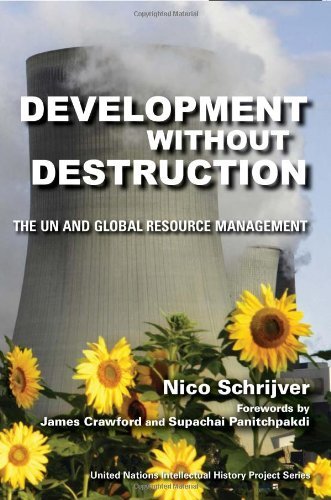In his engaging and practical book Development Without Destruction: The UN and Global Resource Management, Nico Schrijver shows how the UN developed into a hub for natural resource management by default, not by design. As this comprehensive contribution to the UN Intellectual History Project series recounts, the Charter of the United Nations does not discuss natural resources and does not enshrine environmental conservation.
In his engaging and practical book Development Without Destruction: The UN and Global Resource Management, Nico Schrijver shows how the UN developed into a hub for natural resource management by default, not by design. As this comprehensive contribution to the UN Intellectual History Project series recounts, the Charter of the United Nations does not discuss natural resources and does not enshrine environmental conservation. The apparent ‘default’ status of UN resource management efforts has provided critics of the UN with plenty of ammunition over the years. In this makeshift context, co-ordination failures and public relations slip-ups have occasionally undermined the environmental efforts of an alphabet soup of UN specialized agencies and programs.
In his account of the attempt to secure a World Charter for Nature, for example, Schrijver, the Chair of Public International Law at Leiden University in the Netherlands, alludes to one particularly glaring example of the contradictions enabled by scattershot resource management efforts. This Charter was a lofty package of principles that aimed to guide all human conduct affecting nature, and to judge such conduct. UN inter-agency collaboration to advance these principles culminated in 1982 when President Mobutu Sese Seko of Zaire, the kleptocrat infamous for sporting his signature leopard skin hat, was called upon to introduce the new charter to the General Assembly. In hindsight, the image of an environmental criminal exhorting the UN members to adopt a hortatory resolution with no legal force underscores the shortcomings of the milieu Schrijver has painstakingly detailed. His rich descriptive accounts portray a lack of system-wide coherence on the development-environment nexus, and draw attention to the need for UN members to hit the reset button and establish a more robust framework for global environmental governance.
Schrijver offers a nuanced solution to the status quo. To quicken the pace of the UN’s work to facilitate development without destruction he suggests that environment and development efforts be streamlined into a specialized UN agency or an even more comprehensive World Environment Organization (WEO). Schrijver’s book provides environmentalists the world-over with facts that could be used to push for the creation of a new wellspring such as the WEO to advance the sustainable development agenda. At the very least, his review of the ‘poorly organized mosaic of institutions’ and agreements in this area could be used to countervail the power of the forces working against UN reform, or to challenge those who continue to assert that free trade should necessarily trump environmental protection.
This book is essential reading for those who want to know about the numerous successes of international co-operation to advance resource management principles, and the reasons behind notable failures. While Schrijver’s descriptive and historicist orientation could have been strengthened had he analyzed the ways that political economy factors and realpolitik have constrained the UN, this book is an indispensable reference and a well-structured teaching tool. A legal perspective on the history of UN ideas, norms, rules, processes and institutions, Development Without Destruction is an obligatory guide for those who want to understand global environmental governance in order to change it.
Development Without Destruction, Nico Schrijver, Bloomington, Indiana: Indiana University Press, 2010, 297 pages
Subscribe now to get more book reviews in your mailbox!
Reviewer Information
Adam Sneyd is assistant professor of international political economy and development at the University of Guelph. His book, Governing Cotton: Globalization and Poverty in Africa, is published by Palgrave Macmillan.













